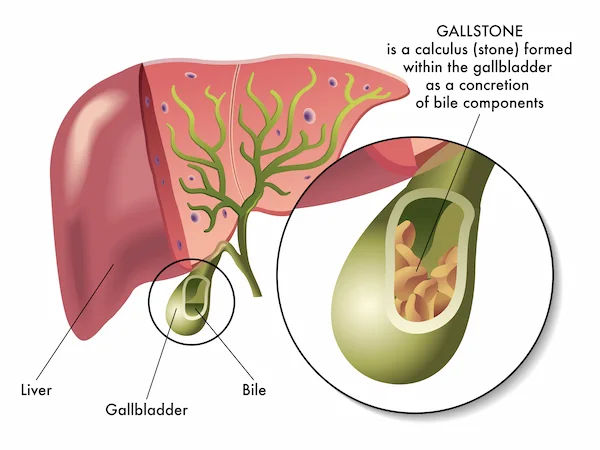Gallstones Treatment Options Without Surgery
Explore non-surgical treatment options for gallstones, including oral medications, lifestyle changes, and natural remedies. Learn when surgery is necessary and how to manage symptoms.

Written by
Last updated on 27th Jul, 2025

Gallstones are small, hard deposits that form in the gallbladder—a small organ beneath the liver that stores bile, a digestive fluid. While some people with gallstones experience no symptoms, others may suffer from intense pain, nausea, and digestive issues. If you’ve been diagnosed with gallstones but want to avoid surgery, there are several non-surgical treatment options available.
This article will guide you through the causes, symptoms, and non-surgical ways to manage gallstones effectively.
Understanding Gallstones
Here is an overview about gallstones and it’s symptoms:
What Are Gallstones?
Gallstones are solid particles that develop when substances in bile (such as cholesterol or bilirubin) harden. They can range in size from tiny grains to large, golf ball-sized stones.
Common Symptoms of Gallstones
Severe abdominal pain (usually in the upper right side)
Nausea and vomiting
Bloating and indigestion
Pain after eating fatty foods
Jaundice (yellowing of skin and eyes) if a stone blocks the bile duct
Causes of Gallstones
High cholesterol in bile (most common cause)
Excess bilirubin (seen in liver diseases)
Gallbladder not emptying properly
Obesity, rapid weight loss, or high-fat diets
Diabetes or hormonal changes (e.g., pregnancy)
Non-Surgical Treatment Options for Gallstones
If your gallstones are small and not causing severe symptoms, your doctor may recommend non-surgical treatments. Here are some effective options:
1. Oral Dissolution Therapy
How it works: Certain medications (like ursodeoxycholic acid or chenodiol) help dissolve cholesterol-based gallstones over time.
Best for: Small cholesterol stones in patients who cannot undergo surgery.
Duration: May take months or years to work fully.
Limitations: Stones may return after stopping medication.
2. Shock Wave Lithotripsy (ESWL)
How it works: Uses sound waves to break gallstones into smaller pieces, which can then pass naturally.
Best for: Patients with a few small stones and a functioning gallbladder.
Limitations: Not suitable for large or calcified stones.
3. Endoscopic Removal (ERCP)
How it works: A thin tube (endoscope) is passed through the mouth to remove stones stuck in the bile duct.
Best for: Gallstones causing blockages but not located in the gallbladder itself.
Recovery: Quicker than surgery, but may need follow-up care.
4. Natural Remedies & Lifestyle Changes
While not a guaranteed cure, these methods may help prevent gallstone formation and reduce symptoms:
Dietary Adjustments
Eat more fiber (fruits, vegetables, whole grains).
Reduce fatty, fried, and processed foods.
Stay hydrated (drink plenty of water).
Include healthy fats (like olive oil, nuts, and fish).
Consult Top Hepatologist For More Health Benefits
Weight Management
Lose weight gradually (rapid weight loss increases gallstone risk).
Exercise regularly to maintain a healthy metabolism.
Herbal & Home Remedies
Apple cider vinegar (mixed with water) may help reduce cholesterol buildup.
Lemon juice & olive oil cleanse (some believe it helps flush small stones).
Peppermint tea may ease digestion and reduce discomfort.
Note: Always consult a doctor before trying home remedies, as they may not work for everyone.
When Is Surgery Necessary?
While non-surgical treatments can help, surgery (cholecystectomy) may be needed if:
Stones are too large to dissolve or pass.
You experience frequent, severe pain or infections.
There’s a risk of complications (like pancreatitis).
If your doctor recommends surgery, laparoscopic (keyhole) surgery is a common, minimally invasive option with quick recovery.
Preventing Gallstones
To lower your risk of developing gallstones:
Maintain a healthy weight (avoid yo-yo dieting).
Eat a balanced, low-cholesterol diet.
Exercise regularly.
Stay hydrated.
Limit sugary and fatty foods.
When to See a Doctor
Seek medical help if you experience:
Severe, persistent abdominal pain
Fever or chills (signs of infection)
Yellowing of skin/eyes (jaundice)
Dark urine or pale stools
If you’re unsure about your symptoms, you can consult a specialist on Apollo 24|7 for expert advice and personalised treatment options.
Conclusion
Gallstones can be painful, but not all cases require surgery. With the right diet, medications, and lifestyle changes, many people manage their symptoms effectively. However, always follow your doctor’s advice and seek medical attention if symptoms worsen.
Need help? Book a consultation with a gastroenterologist on Apollo 24|7 today for expert guidance on gallstone treatment!
Consult Top Hepatologist For More Health Benefits
Consult Top Hepatologist For More Health Benefits

Dr. Srinivasa Reddy
Hepatologist
12 Years • MBBS, MD (General Medicine), DM (Hepatology),ASGE
Hyderabad
Myra Liver & Gastro Care, Hyderabad

Dr. E Prabhakar Sastry
General Physician/ Internal Medicine Specialist
40 Years • MD(Internal Medicine)
Manikonda Jagir
Apollo Clinic, Manikonda, Manikonda Jagir
(125+ Patients)

Dr. Sushith C
General Physician
2 Years • MBBS
Bengaluru
PRESTIGE SHANTHINIKETAN - SOCIETY CLINIC, Bengaluru

Dr U V U Vamsidhar Reddy
Hepatologist
10 Years • MBBS, MD (JIPMER), DM (Hepatology, PGIMER)
Chennai
Apollo Hospitals Greams Road, Chennai
(100+ Patients)

Dr. Aakash Garg
Gastroenterology/gi Medicine Specialist
12 Years • MBBS, DNB (Medicine), DrNB (Gastroentrology).
Bilaspur
Apollo Hospitals Seepat Road, Bilaspur
(125+ Patients)